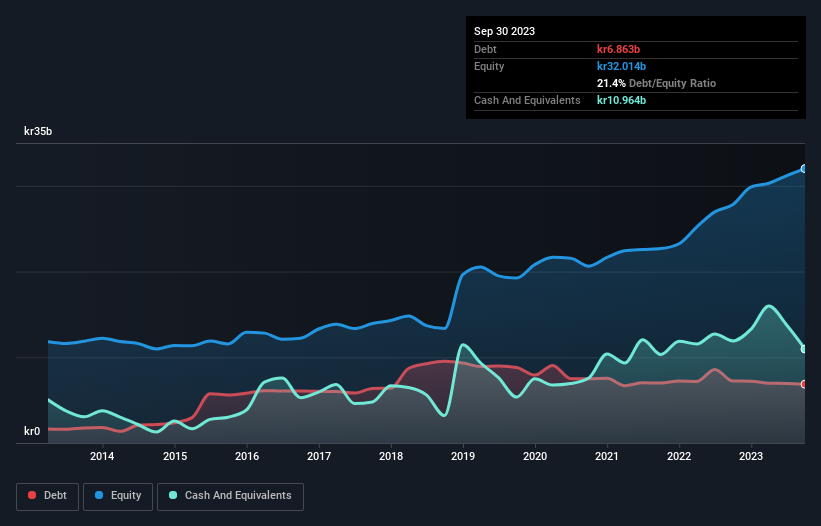
Warren Buffett famously said, 'Volatility is far from synonymous with risk.' So it might be obvious that you need to consider debt, when you think about how risky any given stock is, because too much debt can sink a company. We note that Saab AB (publ) (STO:SAAB B) does have debt on its balance sheet. But the more important question is: how much risk is that debt creating?
When Is Debt Dangerous?
Debt assists a business until the business has trouble paying it off, either with new capital or with free cash flow. Part and parcel of capitalism is the process of 'creative destruction' where failed businesses are mercilessly liquidated by their bankers. While that is not too common, we often do see indebted companies permanently diluting shareholders because lenders force them to raise capital at a distressed price. By replacing dilution, though, debt can be an extremely good tool for businesses that need capital to invest in growth at high rates of return. The first step when considering a company's debt levels is to consider its cash and debt together.
Check out our latest analysis for Saab
What Is Saab's Net Debt?
The image below, which you can click on for greater detail, shows that Saab had debt of kr6.86b at the end of September 2023, a reduction from kr7.22b over a year. But it also has kr11.0b in cash to offset that, meaning it has kr4.10b net cash.

How Strong Is Saab's Balance Sheet?
According to the last reported balance sheet, Saab had liabilities of kr33.9b due within 12 months, and liabilities of kr13.6b due beyond 12 months. On the other hand, it had cash of kr11.0b and kr21.7b worth of receivables due within a year. So its liabilities total kr14.8b more than the combination of its cash and short-term receivables.
Since publicly traded Saab shares are worth a total of kr90.0b, it seems unlikely that this level of liabilities would be a major threat. However, we do think it is worth keeping an eye on its balance sheet strength, as it may change over time. Despite its noteworthy liabilities, Saab boasts net cash, so it's fair to say it does not have a heavy debt load!
In addition to that, we're happy to report that Saab has boosted its EBIT by 38%, thus reducing the spectre of future debt repayments. There's no doubt that we learn most about debt from the balance sheet. But it is future earnings, more than anything, that will determine Saab's ability to maintain a healthy balance sheet going forward. So if you want to see what the professionals think, you might find this free report on analyst profit forecasts to be interesting.
But our final consideration is also important, because a company cannot pay debt with paper profits; it needs cold hard cash. Saab may have net cash on the balance sheet, but it is still interesting to look at how well the business converts its earnings before interest and tax (EBIT) to free cash flow, because that will influence both its need for, and its capacity to manage debt. Over the last three years, Saab recorded free cash flow worth a fulsome 85% of its EBIT, which is stronger than we'd usually expect. That puts it in a very strong position to pay down debt.
Summing Up
Although Saab's balance sheet isn't particularly strong, due to the total liabilities, it is clearly positive to see that it has net cash of kr4.10b. The cherry on top was that in converted 85% of that EBIT to free cash flow, bringing in kr914m. So is Saab's debt a risk? It doesn't seem so to us. We'd be very excited to see if Saab insiders have been snapping up shares. If you are too, then click on this link right now to take a (free) peek at our list of reported insider transactions.
If you're interested in investing in businesses that can grow profits without the burden of debt, then check out this free list of growing businesses that have net cash on the balance sheet.
New: Manage All Your Stock Portfolios in One Place
We've created the ultimate portfolio companion for stock investors, and it's free.
• Connect an unlimited number of Portfolios and see your total in one currency
• Be alerted to new Warning Signs or Risks via email or mobile
• Track the Fair Value of your stocks
Have feedback on this article? Concerned about the content? Get in touch with us directly. Alternatively, email editorial-team (at) simplywallst.com.
This article by Simply Wall St is general in nature. We provide commentary based on historical data and analyst forecasts only using an unbiased methodology and our articles are not intended to be financial advice. It does not constitute a recommendation to buy or sell any stock, and does not take account of your objectives, or your financial situation. We aim to bring you long-term focused analysis driven by fundamental data. Note that our analysis may not factor in the latest price-sensitive company announcements or qualitative material. Simply Wall St has no position in any stocks mentioned.
About OM:SAAB B
Saab
Provides products, services, and solutions for military defense, aviation, and civil security markets worldwide.
Flawless balance sheet with solid track record.


